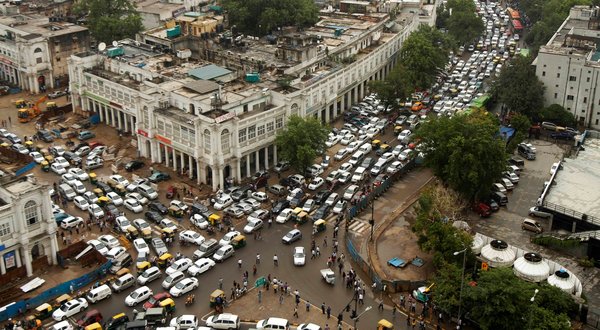
NEW DELHI — About 600 million people lost power in India on Tuesday when the country’s northern and eastern electricity grids failed, crippling the country for a second consecutive day.
The outage stopped hundreds of trains in their tracks, darkened traffic lights, shuttered the Delhi Metro and left nearly everyone — the police, water utilities, private businesses and citizens — without electricity. About half of India’s population of 1.2 billion people was without power.
India, however, has an unofficial power grid in the form of huge numbers of backup diesel generators and other private power sources. That kept electricity flowing in everything from private residences and small and large businesses to hospitals and major airports.
Manoranjan Kumar, an economic adviser with the Ministry of Power, said in a telephone interview that the grids had failed and that the ministry was working to figure out the source of the problem. The northern and eastern grids cover 11 states and the capital city of Delhi, stretching from India’s northern tip in Kashmir to Rajasthan to West Bengal’s capital of Kolkata.
The failure happened without warning just after 1 p.m., electric company officials said.
“We seem to have plunged into another power failure, and the reasons why are not at all clear,” said Gopal K. Saxena, the chief executive of BSES, an electric company that services South Delhi, in a telephone interview. It may take a long time to restore power to north India, he said, because the eastern grid has also failed, and alternate power sources in Bhutan and the Indian state of Sikkim flow into the east first.
About two hours after the grid failure, power ministry authorities said some alternate arrangements had been made. “We are taking hydro power from Bhakhra Nangal Dam,” in northern India, said Sushil Kumar Shinde, the power minister, in a televised interview.
India has struggled to generate enough power of its own to fuel businesses and light homes, and the country relies on huge imports of coal and oil to power its own plants. But supply and demand may not explain away this week’s grid failures, power executives said.
The failure on Tuesday affected roughly twice as many people as the massive power outage the previous day, when the northern power grid failed and left more than 300 million people without power for several hours. No official reason for the Monday’s failure has been given, although some local news reports pointed fingers at state governments which were overdrawing power.
That assessment is too simplistic, Mr. Saxena, of BSES, said. There are controls in place on India’s electricity grids that override an outsized power demand. “We have one of the most robust, smart grids operating” in the world, he said. It would “not be wise” to give an assessment of what happened at this time, he added.
Institutions without a private backup system were shuttered. All trains stopped in the Delhi Metro, which carries nearly 2 million passengers a day. Trains were pulled to the closest stations using battery back up, and then evacuated, a spokeswoman for the Delhi Metro said, and the stations have been locked. “We had never anticipated such a thing,” the spokeswoman said.
A trade body, the Associated Chambers of Commerce and Industry of India, or Assocham, said that Monday’s power problem “totally disturbed the normal life and has severely impacted the economic activities.”
Niharika Mandhana and Hari Kumar contributed to this story from New Delhi.






